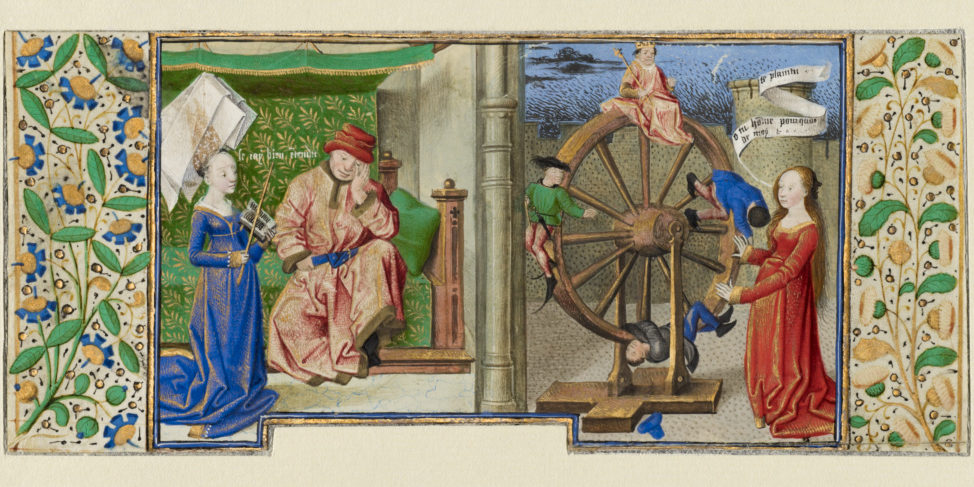
Boethius and the Sleeplessness of Macbeth: Part II
Boethius (480-524) was a Christian philosopher who lived in troubled times. After the Roman Empire had been divided up, and the Western half was taken over by the Goths, Boethius became a political diplomat under the employ of Rome’s Gothic King, Theodoric (454-526). Eventually, Theodoric came to suspect Boethius of treason, and as a result imprisoned, tortured, and eventually executed him. Incidentally, Theodoric was an Arian, and Boethius was a Nicene Creed-defending orthodox theologian, but this is probably not why he was executed. Likely, it came down to the fact that Boethius’s diplomatic visits to the Eastern Kingdom of the Roman Empire were spent trying to maintain a cohesive sense of Roman identity for the East and the West, instead of simply jockeying for western independence (which is what Theodoric wanted). In any case, Theodoric went the way of countless other kings, and what began as a generally peaceful reign devolved into conspiratorial suspicion and paranoia. Theodoric went the way of Macbeth, and Boethius was one of his casualties. But this is not why I bring up Boethius.With the help of Lady Philosophy, Boethius covers the topic of true happiness, the problem of evil, and the mystery of divine providence and human free-will. Click To Tweet
While Boethius was in prison, awaiting his execution, he wrote a short treatise called The Consolation of Philosophy, which became one of the most widely read—and highly esteemed—works of philosophy for the next thousand years. In this work, Boethius is grieving his misfortune, when Lady Philosophy appears in his room in personified form and begins a dialogue with him. The conversation yields the consolation Boethius needs as he awaits his impending death. The work as a whole is a masterpiece, filled with allusions to Scripture, Greek and Roman mythology, and ancient Greek philosophy. Every chapter includes a corresponding poem, and the prose are riveting. With the help of Lady Philosophy, Boethius covers the topic of true happiness, the problem of evil, and the mystery of divine providence and human free-will.
The Consolation of Lady Wisdom
As a very (not-so-)brief aside, I should address one of the most common misconceptions about The Consolation of Philosophy. It is not uncommon to portray Boethius as the last classical philosopher and the first truly medieval philosopher. This is not all that problematic of a claim, so far as it goes. After all, he is truly Medieval in his cosmology on the one hand, while he demonstrates a mastery of Plato and Aristotle on the other. However, some conceptualize him as the first scholastic philosopher on the grounds that he sharply distinguishes between faith and reason. The Consolation of Philosophy, the argument goes, is not a religious or theological work at all, and he has therefore left faith in this treatment. Some would even go so far as to question how Christian we should think of Boethius, since his last and most personal work seems to be so philosophically minded, instead of religiously oriented.
In reality, however, this depiction is wrong on all accounts. Not only is it untrue that nearly all medieval philosophical theologians saw a hard separation between faith and reason (this may be said of the likes of Peter Abelard or John Duns Scotus or William of Ockham, but certainly not of Anselm of Canterbury or Thomas Aquinas), it is also untrue that The Consolation of Philosophy traffics in such a disjunction. To the degree that this charge sticks to Boethius in this book, it would also apply to Solomon in Ecclesiastes.Lady Philosophy does not console Boethius apart from faith. She is Lady Wisdom herself. One and the same as she who begins her consoling with “the fear of the LORD.” Click To Tweet
Speaking of Solomon and Ecclesiastes, I think keeping biblical wisdom literature is our clue to understanding what Boethius is up to in The Consolation of Philosophy. The personification of Lady Philosophy should rightfully conjure in our minds the personification of Lady Wisdom (cf., Proverbs 8-9). We may even be so bold as to say that they are one in the same person. This is seen not only in Lady Philosophy’s prompting for Boethius to pray to the “Father of all things” (Book III.4), or her reverent hymns sung to him (“the fear of the Lord is the beginning of wisdom”), but also in her explicit statements regarding who she does not belong to. When she enters into Boethius’s cellar at the beginning of the book, certain parts of her garments have been taken from her. We discover that they were tore unjustly from her, when “the mobs of Epicureans and Stoics and the others each did all they could to seize for themselves the inheritance of wisdom that [Socrates] left. As part of their plunder they tried to carry me off, but I fought and struggled, and in the fight the robe was torn which I had woven with my own hands” (II.3).
While Socrates discovered her, the Epicureans and Stoics tried unlawfully to take her. They got some garments (i.e., you will find among the Epicureans and Stoics nuggets of truth—shreds of Lady Philosophy’s garments), but she does not belong to them. She will not be called theirs. Is it a coincidence that the Epicureans and Stoics are explicitly named as Paul’s jeering audience at the Areopagus in Athens (Acts 17:16-32)? I don’t think so.
So, no, Lady Philosophy does not console Boethius apart from faith. She is Lady Wisdom herself. One and the same as she who begins her consoling with “the fear of the LORD.” And in The Consolation of Philosophy, she consoles Boethius with the same medicine she consoles Solomon with in Ecclesiastes, for their ailment is the same. Both philosophers grieved Fortune’s Wheel. Both philosophers lamented the enigmatic and exasperating fate of random chance. And both were directed beyond their temporal circumstances—beyond that which is under the sun—to the God who is above the sun for their consolation.
The (Would-Be) Consolation of Macbeth
But before Lady Philosophy takes Boethius to find ultimate happiness in the Good (God himself), she begins to lead him there by a process of elimination. She has to first show Boethius where happiness is not found. And this is where we return to Macbeth. Miserable Macbeth. Paranoid and conspiratorial and frantic and reactionary Macbeth. Poor Macbeth. If only he sought the muse of Lady Philosophy rather than that mistress, Ambition! Philosophy could have warned him of the fruitlessness of his path—the barrenness.
In Book III of The Consolation, Lady Philosophy helps Boethius to see that true blessedness is not found in wealth, for wealth cannot satiate desire, and the presence of unsatisfied desire proves the absence of blessedness (III.3). Nor is blessedness found in honor (III.4), nor glory and fame (III.6), nor bodily pleasure (III.7). Wealth, sought after as the satiation of all blessedness itself becomes poverty, for it does not satisfy, and the person bereft of his heart’s desire is poor in that respect. The attainment of a position of honor is no promise that a person truly has honor. As we who must constantly stave off the temptation of cynicism toward all politicians will readily recognize: often the person who aspires to a position of honor has to become dishonorable in order to gain it. Glory and fame are also fragile and are therefore unfit as the telos of blessedness. And perhaps nothing is so hopeless as the pursuit of bodily pleasure as a source of lasting satisfaction: “Its pursuit is full of anxiety and its fulfilment full of remorse. Frequently, like a kind of reward for wickedness, it causes great illness and unbearable pain for those who make it their source of enjoyment” (III.7). We could, perhaps, connect all of these “dead ends” to the tragic case of Macbeth, but none so pointedly as the one dead end I skipped: power (III.5).Power, when pursued as an ultimate end, actually, in a twist of irony, turns into weakness. Click To Tweet
Power, when pursued as an ultimate end, actually, in a twist of irony, turns into weakness. “What is this power, then,” asks Lady Philosophy, “which cannot banish the nagging of worry or avoid the pin-prick of fear? And then they boast in their power” (III.5)! It is hard to imagine Macbeth avoiding the chair occupied by Banquo’s ghost—whom no one else can see—as strong. He is worried, frantic, and terrified, while his dinner guests are oblivious to the cause of his fears—they think he’s going crazy (and, in a very real sense, he is) (Act III.4). Having murdered Banquo in pursuit of unchallenged strength, Macbeth is reduced to a pitiful display of weakness. We should think of him thusly as we heed Lady Philosophy’s instruction: “Do you think of a man as powerful when you see him lacking something which he cannot achieve? A man who goes about with a bodyguard because he is more afraid than the subjects he terrorizes, and whose claim to power depends on the will of those who serve him? And what should I say of the friends of kings, when I can show that kingship itself is full of such weakness?” (Book III.5).
What Lady Philosophy teaches—and what Macbeth and countless other examples demonstrate—is that there is a kind of power that once achieved turns into weakness. Thus, the poem Lady Philosophy recites in book four of The Consolationwe may properly address to Macbeth and everyone else who follows in his footsteps:
High kings you see sit loftily on thrones,
In purple bright, by sober arms enhedged,
With savage threat in passion’s breathless rage;
Once strip from pride their robes of empty show,
And see within the straitening fetters worn:
Here lust o’erthrows the heart with poisonous greed,
Here like a wave wrath whips and bears off sense,
Here captive sorrow sits or hope torments;
Here in one heart so many tyrants rule,
The king’s own will’s deposed, the enslaver slaved. (Book IV.2)
There is a kind of fragility that only applies to those who boast of self-wrought strength. The person whose strength is achieved and maintained on their own efforts, stopping at nothing to achieve it, is actually a pitiful weakling, in the final analysis. His strength is completely contingent upon the house of cards he has built for himself, and his desperation to keep it in tact bespeaks his true weakness. But the person who receives strength, and everything else, as a gift from the Father of Lights, is truly strong. His strength isn’t subject to shifting circumstances, because it wasn’t achieved circumstantially.
For whoever would save his life will lose it, but whoever loses his life for my sake will save it. For what does it profit a man if he gains the whole world and loses or forfeits himself? (Luke 9:24-25)
This is Part II of a two-part essay on power and the fragility of Godless ambition. Read Part I here.

